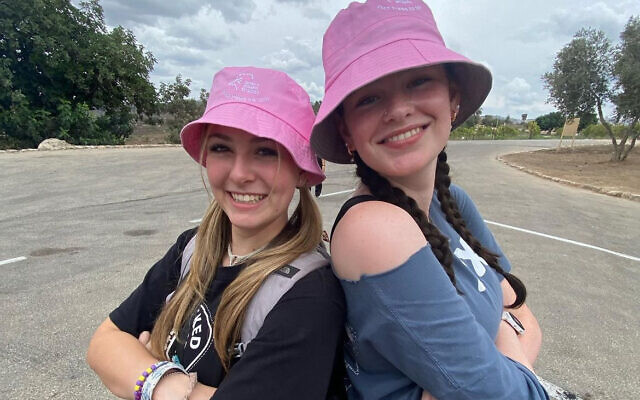Atlanta Residents Had Harrowing Departure from Israel
Many managed to flee the war before the U.S. State Department arranged planes and ships.

When air raid sirens started blaring over Israel early Saturday morning, Oct. 7, thousands of American Jews — business people, tourists, and high school students — were suddenly trapped in a war zone. Flights were quickly canceled, and everyone scrambled to get information and find any way out of the country.
One week later, the U.S. government finally engaged charter flights to start transporting more than 20,000 U.S. citizens who had contacted the U.S. embassy saying they wanted to leave. Flights were to head for Frankfurt and Athens. And on Monday, Oct. 16, an emergency evacuation ship was scheduled to depart from Haifa, bound for Cyprus and designated only for “U.S. nationals and their immediate family members with a valid travel document.”
But many Atlanta-area residents who found themselves in a totally unforeseen, unfathomable situation didn’t wait for the U.S. government. Some of those departures may have been just one shade shy of a miracle.
Seventeen-year-old Fayetteville resident Lyla Caplan said she was on a field trip in Jerusalem with her fellow students who were attending the Union for Reform Judaism Heller High based on the Alexander Muss High School in Israel campus in Hod Hasharon when she was awakened by sirens and banging on her hotel room door. “It was terrifying,” she told the AJT.
The group returned to the Muss campus hours later and slept in the campus bomb shelter until a plane could be arranged for her fellow Heller students as well as dozens more high school students attending various Muss programs. On Thursday, Oct. 12, after an overnight in Rome, about 100 students landed in Boston, from where they traveled on to their home cities and eager parents’ arms.
While Caplan and her friends were being told they would need to leave Israel long before the end of their programs, unbeknownst to them, an Atlanta-based CEO of an Israeli travel agency was frantically trying to orchestrate their safe escape.

Cheri Scheff Levitan modestly told the AJT that she “didn’t do anything anyone wouldn’t do,” but as she narrated on Facebook her adventurous attempts to organize a flight for the students to anywhere from which they could return to the U.S., she was hailed by many parents as a hero.
As one parent wrote, “What you did was a miracle to get these kids on a plane. The fear and guilt that these parents are experiencing knowing that they sent their beautiful children for an amazing life experience and instead it turned into a war zone!!! What a true mitzvah!!!”
Describing her challenges after her own return to Atlanta, the day before the teenagers, Levitan at times broke down in tears. She had been on a business trip to Israel which also allowed her to see her two sisters who live there, and their families. (A nephew in the IDF tank corps was called up while she was in Israel.)
Jewish National Fund-USA, which operates the Muss program is a client of her company, Kenes Tours. Two days after the war broke out, a JNF executive called her with a plea, “Cheri, can you get our kids out?”
“I had been a parent of a Muss student,” she said. Along with her thoughts of parents of current students, she thought, “if anything happens to these kids, what are the liabilities of a major non-profit?” One of her sisters questioned how she could arrange the complex operation, but she decided, “I can do this.”
El Al wanted $1 million to charter a flight to take the teens out of Israel. “No one can okay an expenditure like that,” said Levitan. After she arranged for IsrAir to transport the kids to Rome, she called JNF at 4:30 in the morning, saying “I need you to say yes. What I cared about was getting all the kids on one plane.”
Levitan credits a team of people almost across the globe with the myriad details and arrangements, from getting the kids to the airport near Tel Aviv, upon landing in Rome, finding three buses to take them to their hotel rooms which needed to be reserved, getting them meals, and again getting buses to return them to the airport the next morning.
“It was a major group effort in which everyone pulled together. I told my team not to take no for an answer. It really did take a village,” she said.
While Levitan was focused on getting the students out, she was also searching for her own way to leave Israel, and running back and forth between her hotel room and the stairwell in her hotel which was considered the “safe space” when Hamas rockets were flying overhead.
“My first experience with bomb shelters was when I was 12,” she recounted. She knew the drill: shoes by the door, bottled water, keys ready and phone charged. She slept in her clothes. When she eventually got on her El Al flight for London – after terrifying few moments delayed on the tarmac hearing rockets overhead – she said she felt sick.
“I was very nervous,” she said. Once the plane cleared Israeli airspace, she had a good cry. And when Wi-Fi became available, she got to work. “I worked the entire flight.”
Upon landing, an airplane employee announced that there would be “police and government officials” greeting the passengers to ask if they needed help dealing with their trauma or to document war crimes.
“This was another first for me,” Levitan laughed. “There are friends overseas who care about us.”
Levitan wasn’t the only one crying as she left Israel. After Caplan and her fellow students arrived at the Israeli airport, they were rushed into bomb shelters as sirens went off. “I broke down when I got on the plane and we were safe,” she said.
But she “100 percent” wants to return to Israel when she can. She had arrived on Aug. 23 and expected to stay there until Dec. 21. Coming from a small Jewish community, she had looked forward to meeting new people. She had traveled to Israel twice before, once with her family in 2019.
Leaving Israel was “devastating and heart-breaking,” said Caplan. At first, the students didn’t want to leave until the war situation was explained to them. The students were told to pack only one bag, under 50 pounds, leaving the rest of their belongings to be shipped later.
With the rest of their time, the students put together 1,600 care packages to send to hospitals in Israel, and, according to a JNF spokesperson, the students – on their own – raised more than $100,000. JNF has a goal to raise $10 million within the next 30 days as part of its resilience campaign.
Meanwhile, the Muss campus is the new temporary home for Israelis displaced from their homes in Israel’s south because of the war. “The hundreds of beds there will be fully utilized,” the spokesperson said.
Referring to the students, he added, “We talk about them [the students] as future leaders, but the truth is that future is today.” And, in an understatement about their airlift home: “People were working around the clock to find a solution. It was certainly a heavy lift.”
At press time, Delta Air Lines had canceled all flights to Tel Aviv through Oct. 31. American Airlines canceled its flights through Dec. 4.



comments